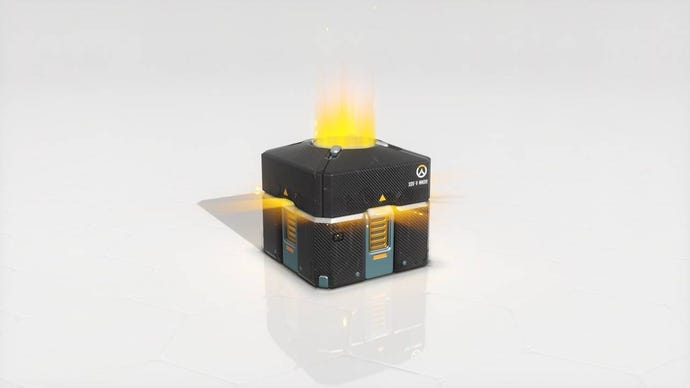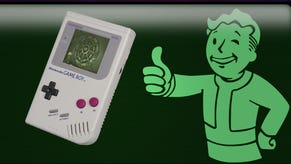The Loot Box Bill is Public, And The ESA Says It's "Flawed And Riddled With Inaccuracies"
The newly introduced bill could end up affecting more than just loot boxes.
This article first appeared on USgamer, a partner publication of VG247. Some content, such as this article, has been migrated to VG247 for posterity after USgamer's closure - but it has not been edited or further vetted by the VG247 team.
The infamous "loot box bill" introduced by Missouri senator Josh Hawley has been formally filed to the United States Senate today. The "Protecting Children from Abusive Games Act," or PCAGA, has been made publicly available online, and entities like the Entertainment Software Association already have some issues with it.
You can read the bill for yourself here, but a few points stick out on our first read, namely in the definitions used throughout the bill. There are a lot of different kinds of microtransactions after all, from gacha rolls and sped-up timers to full-on expansion packs, and this bill doesn't seem well-suited to grapple with that nuance.
Hawley's bill is intended to regulate "certain pay-to-win microtransactions and sales of loot boxes in interactive digital entertainment products." In an interview with Kotaku, Hawley says the "C-suite" is "basically adding casinos to children's games." It has support from Republicans and Democrats like Ed Markey (D-Mass), but what does it actually say?
Its definition of loot boxes seems fairly straightforward at first: anything that is a randomized unlock with unknown content falls under this category. The wording gets a little vague though, saying it must "[add] to or [enhance] the entertainment value of the product." You might think that Overwatch loot boxes would fall under this section, but it makes specific exceptions for a few areas: difficulty modes, cosmetic items, and downloadable expansions. It also puts transactions like a booster pack in Magic: The Gathering Arena or Hearthstone in trouble.
Pay-to-win gets a little more nebulous. Under the bill's points, some existing content models which one would normally not consider pay-to-win, suddenly do become that. For example, in Super Smash Bros. for Wii U, the downloadable character Bayonetta reigned supreme on tier lists. Since she's a purchasable, optional slice of content, she could theoretically provide a user "with a competitive advantage with respect to the game's competitive aspects over users who do not make such a transaction."
But a sweeping aspect of the bill is how it defines the games it targets. As Hawley noted, this bill is aimed at children being drawn in by microtransactions and loot boxes. So how do you define whether a game is intentionally marketed towards a minor?
(5) MINOR-ORIENTED GAME.—The term ‘‘minor-oriented video game’’ means an interactive digital entertainment product for which the target audience is individuals under the age of 18, as may be demonstrated by—
- (A) the subject matter of the product;
- (B) the visual content of the product;
- (C) the music or audio content of the product;
- (D) the use of animated characters or activities that appeal to individuals under the age of 18;
- (E) the age of the characters or models in the product;
- (F) the presence in the product of—
- (i) celebrities who are under the age of 18; or
- (ii) celebrities who appeal to individuals under the age of 18;
- (G) the language used in the product;
- (H) the content of materials used to advertise the product and the platforms on which such materials appear;
- (I) the content of any advertising materials that appear in the product;
- (J) other reliable empirical evidence relating to—
- (i) the composition of the audience of the product; or
- (ii) the audience of the product, as intended by the publisher or distributor of the product; or
- (K) other evidence demonstrating that the product is targeted at individuals under the age of 18.
These clauses provide an exhaustively broad brush to paint with, culminating in that final point: This allows many games that adults likely enjoy to fall under the definition of "minor-oriented." It could effectively target Overwatch, Fortnite, but even be reasonably stretched to cover further ground.
Most noticeably absent is the use of ESRB terms. M-rated games are regulated to require an age check or parental / guardian consent to purchase, and yet the definition of a minor-oriented game makes no mention of E, T, or M ratings.
When reached for comment, the Entertainment Software Association provided this statement from chief executive officer Stanley Pierre-Louis:
This legislation is flawed and riddled with inaccuracies. It does not reflect how video games work nor how our industry strives to deliver innovative and compelling entertainment experiences to our audiences. The impact of this bill would be far-reaching and ultimately prove harmful to the player experience, not to mention the more than 220,000 Americans employed by the video game industry. We encourage the bill’s co-sponsors to work with us to raise awareness about the tools and information in place that keep the control of video game play and in-game spending in parents’ hands rather than in the government’s.
PCAGA has yet to be formally read on the floor, and from there on there are committees, hearings, and votes. But as is, this bill could radically alter the way games are monetized and sold.










.png?width=291&height=164&fit=crop&quality=80&format=jpg&auto=webp)